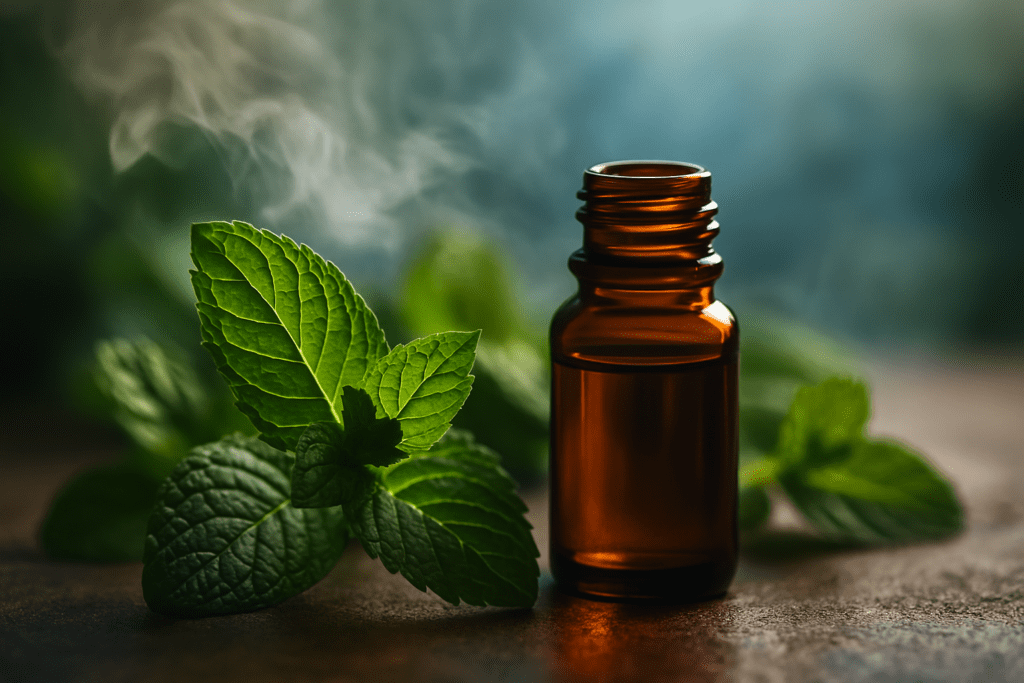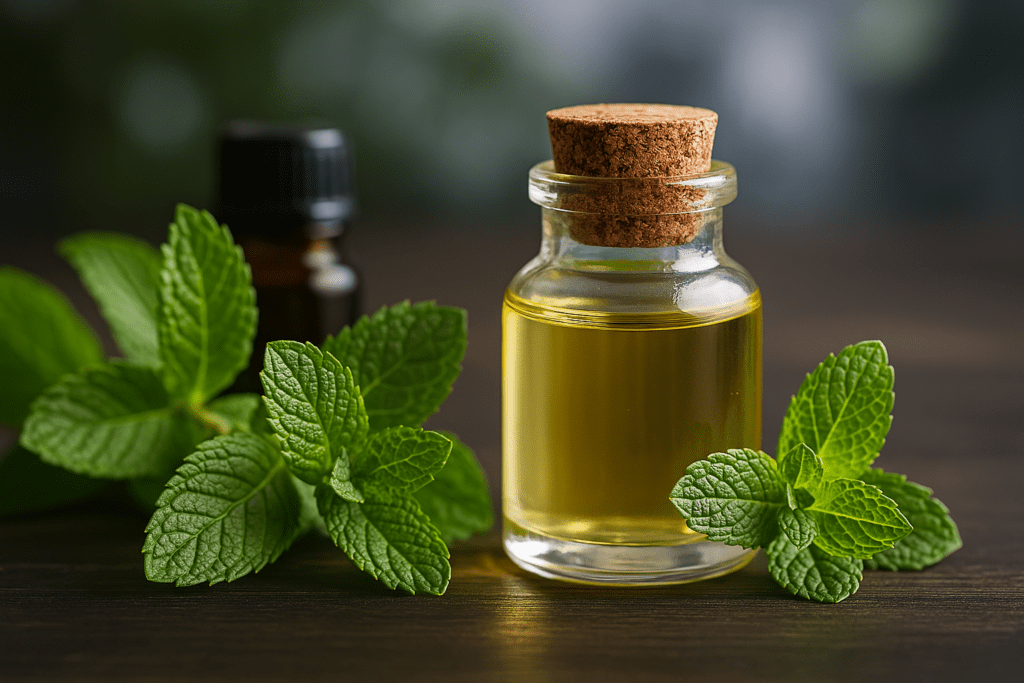Introduction: Understanding Brain Fog and the Growing Interest in Natural Remedies
In an age where mental clarity and peak cognitive performance are in high demand, many people are turning to natural solutions to enhance their brain health. One of the most intriguing remedies gaining popularity is peppermint oil. Traditionally used for digestive relief and respiratory comfort, peppermint oil is now being investigated for its potential to clear brain fog and support sharper mental focus. As modern lifestyles become increasingly fast-paced and cognitively demanding, addressing the root causes of mental fatigue and poor concentration is more relevant than ever. Brain fog—a non-medical term that describes a collection of symptoms like forgetfulness, lack of mental clarity, and difficulty concentrating—affects millions worldwide. The growing curiosity around essential oils, especially peppermint oil, reflects a broader cultural shift toward integrative health and holistic wellness.
You may also like: How to Improve Focus and Concentration: Proven Techniques for Boosting Mental Clarity and Productivity
This article explores the science behind peppermint oil and how it may serve as an effective natural aid for brain fog and concentration issues. By examining peer-reviewed research, expert insights, and practical applications, we delve into how peppermint oil for concentration is more than just a trend—it’s a promising, evidence-backed tool that may benefit long-term cognitive health.
What Is Brain Fog, and Why Does It Matter?
Brain fog is often described as a feeling of mental cloudiness, forgetfulness, and an inability to concentrate. Though it is not classified as a formal medical diagnosis, brain fog is a widely recognized symptom in both clinical and everyday settings. It can be caused by various factors, including chronic stress, poor sleep, hormonal imbalances, nutritional deficiencies, and even certain medications. More recently, long COVID has brought brain fog into the spotlight, highlighting how deeply it can affect daily functioning.
Understanding the implications of brain fog is essential because it can significantly diminish the quality of life. People experiencing this cognitive state often report decreased productivity at work, strained relationships, and a general sense of frustration or discouragement. Addressing brain fog means not only managing symptoms but also identifying and reversing underlying causes.
The rise in interest in essential oils for brain fog stems from a desire for safe, non-invasive treatments that can support mental clarity without the side effects commonly associated with pharmaceuticals. Among these, peppermint oil stands out due to its well-documented effects on the central nervous system.

Peppermint Oil: A Brief Overview of Its Composition and Benefits
Peppermint oil is extracted from the leaves of the Mentha piperita plant, a hybrid of watermint and spearmint. Its primary active compounds are menthol and menthone, both of which are known for their stimulating, cooling, and anti-inflammatory properties. Peppermint oil has been used for centuries in traditional medicine to alleviate gastrointestinal discomfort, respiratory issues, and muscle pain. In recent decades, researchers have begun to explore its cognitive benefits.
One of the key reasons peppermint oil is gaining traction in the realm of cognitive enhancement is its influence on alertness and attention. When inhaled or applied topically, the menthol in peppermint oil activates receptors in the brain associated with increased arousal and mental clarity. This biochemical interaction lays the foundation for using peppermint oil for concentration and mental acuity.
Additionally, peppermint oil’s anti-inflammatory and antioxidant effects may contribute to improved brain health over time. Chronic inflammation and oxidative stress are known contributors to cognitive decline, and mitigating these factors could potentially prevent or reduce episodes of brain fog.
How Peppermint Oil Affects the Brain
Scientific investigations into the neurological effects of peppermint oil have revealed compelling insights. Inhaling peppermint oil has been shown to stimulate the hippocampus, a brain region involved in memory formation and emotional regulation. This stimulation may enhance working memory and elevate mood—both crucial factors for improving mental clarity.
A 2008 study published in the International Journal of Neuroscience demonstrated that participants who inhaled peppermint oil experienced improved memory and increased alertness compared to those who did not. These findings support the idea that peppermint oil for concentration is grounded in measurable cognitive outcomes, not just anecdotal claims.
Peppermint oil also appears to have a positive effect on cerebral blood flow. Enhanced blood circulation means more oxygen and nutrients are delivered to the brain, which is vital for optimal mental function. This mechanism could explain why peppermint oil brain fog interventions may be particularly effective for people dealing with fatigue or sluggish thinking.
Another possible explanation for peppermint oil’s cognitive benefits is its impact on neurotransmitters. Menthol may influence the activity of GABA and acetylcholine, neurotransmitters involved in relaxation and learning, respectively. By modulating these pathways, peppermint oil may support a balanced mental state that is conducive to focus and clarity.
Does peppermint help you focus? Exploring the Research
The question “Does peppermint help you focus?” is more than a casual query—it reflects a genuine scientific interest in natural cognitive enhancers. Multiple small-scale studies and clinical trials suggest that peppermint oil can indeed boost attention and working memory. In academic settings, for example, students exposed to peppermint aroma during tests performed better on tasks that required sustained attention.
A study published in the North American Journal of Psychology found that peppermint scent significantly improved task performance and reduced mental fatigue among college students. Participants reported feeling more alert and capable of concentrating, especially during repetitive or demanding cognitive tasks. These results support the growing use of peppermint oil in environments that require prolonged mental effort, such as offices, classrooms, and even during meditation or study sessions.
While more large-scale studies are needed to confirm these findings and establish dosing standards, the preliminary evidence is promising. The question of “does peppermint help you focus” is increasingly being answered with a confident yes, supported by both empirical data and user testimonials.
Essential Oils for Brain Fog: Why Peppermint Leads the Pack
Among the many essential oils for brain fog, peppermint stands out not only for its unique chemical profile but also for its consistent performance across various cognitive studies. While other essential oils like rosemary, eucalyptus, and lemon balm have been noted for their mental benefits, peppermint oil often produces more immediate and noticeable effects.
What sets peppermint apart is its dual action as both a stimulant and a relaxant. This balance allows it to enhance alertness without inducing the jitteriness often associated with caffeine or synthetic stimulants. Furthermore, its ability to soothe headaches and reduce muscle tension adds another layer of support for individuals whose brain fog may be linked to physical discomfort.
Incorporating peppermint oil into a daily routine can be as simple as adding a few drops to a diffuser, mixing it with a carrier oil for topical application, or using pre-formulated aromatherapy products designed for mental clarity. These versatile options make it easier for individuals to experiment and find the method that works best for them, reinforcing peppermint oil’s place at the forefront of essential oils for brain fog.
How to Use Peppermint Oil for Concentration Safely and Effectively
When it comes to using peppermint oil for concentration, safety and proper application are key. While the oil is generally well-tolerated, it is potent and should be used mindfully to avoid adverse reactions. Diluting peppermint oil with a carrier oil like jojoba or coconut is recommended for topical use, especially when applying it to sensitive areas like the temples, neck, or wrists.
Aromatherapy is one of the most effective methods for harnessing peppermint oil’s cognitive benefits. Inhalation through a diffuser or personal inhaler allows for quick absorption through the nasal mucosa, which directly impacts the brain. This route is particularly helpful for those looking for a fast-acting solution to midday slumps or mental fatigue.
For individuals new to essential oils, it’s important to perform a patch test before applying peppermint oil to the skin. Additionally, individuals with respiratory conditions, children, and pregnant women should consult a healthcare provider before use. By following these guidelines, users can experience the full spectrum of peppermint oil for concentration without compromising safety.
Consistency is another crucial factor. Just as one wouldn’t expect immediate results from a single workout, the benefits of peppermint oil are often cumulative. Regular use in a thoughtfully structured wellness routine can enhance its efficacy and provide lasting improvements in cognitive function.
The Anti-Aging Angle: Long-Term Brain Health and Cognitive Resilience
One of the most compelling reasons to explore peppermint oil brain fog solutions lies in their potential role in long-term brain health. As we age, cognitive decline becomes an increasing concern. While peppermint oil is not a cure for neurodegenerative diseases, its antioxidant and anti-inflammatory properties may contribute to overall brain resilience.
Chronic inflammation and oxidative stress are known contributors to age-related cognitive decline. Menthol and other compounds in peppermint oil may help mitigate these effects by neutralizing free radicals and reducing inflammatory responses in neural tissue. Over time, this can translate to better cognitive performance and possibly delay the onset of memory-related disorders.
Integrating peppermint oil into a broader brain health strategy—which may include nutrition, physical exercise, mental stimulation, and adequate sleep—can create a multi-faceted defense against cognitive aging. In this context, peppermint oil becomes more than a quick fix; it evolves into a proactive tool for sustained mental vitality.
As research continues to uncover the full scope of peppermint oil’s neuroprotective potential, its application in anti-aging and longevity strategies is likely to expand. Whether used independently or as part of an integrative health plan, peppermint oil offers a promising route to not only address immediate concerns like brain fog but also support enduring brain health.

Frequently Asked Questions (FAQ): How Peppermint Oil May Help Clear Brain Fog and Improve Focus Naturally
1. Can peppermint oil be combined with other essential oils for brain fog to boost effectiveness?
Yes, combining peppermint oil with other essential oils for brain fog may enhance its overall cognitive benefits. For example, rosemary oil is often cited for its memory-boosting properties, while lemon oil may elevate mood and alertness. When used together in a synergistic blend, these oils can create a more comprehensive aromatherapeutic effect. Peppermint oil brings mental clarity and energy, while complementary oils may target different aspects of cognitive performance. However, it’s essential to experiment mindfully and track your responses, as combining multiple oils can also increase the risk of overstimulation or allergic reaction. A popular method involves using a diffuser blend of peppermint, rosemary, and lemon essential oils for brain fog relief in home or work environments. This approach may help create a focused, calm mental state that sustains productivity without the jitteriness associated with synthetic stimulants. Users have reported enhanced motivation and a clearer mindset when blending peppermint oil for concentration with these complementary oils. Just be sure to dilute the oils properly and avoid prolonged exposure in enclosed spaces.
2. Is there a best time of day to use peppermint oil for concentration and mental clarity?
Timing can significantly influence the effectiveness of peppermint oil for concentration. For most people, mid-morning or early afternoon is ideal, as these are the times when energy and alertness tend to dip naturally. Using peppermint oil brain fog strategies during these windows may help bridge the gap between caffeine crashes and mental fatigue. Inhalation through a diffuser or roll-on during work breaks can offer a quick mental reset, improving cognitive flexibility and helping users return to tasks with renewed focus. While some prefer to use peppermint oil first thing in the morning, others find it helpful right before high-stakes tasks like meetings, presentations, or study sessions. Since the brain’s responsiveness to essential oils may vary by circadian rhythm and individual brain chemistry, it’s worth testing different time windows to see when you experience the clearest mental benefits. The goal is to use peppermint oil for concentration at points when your cognitive demands are high but your mental energy is dipping. This timing-based approach can help maximize its focus-enhancing properties without interfering with natural rest cycles.
3. How does long-term use of peppermint oil affect cognitive resilience or mental performance over time?
While most people think of peppermint oil brain fog remedies as short-term interventions, there is increasing interest in its long-term effects on brain function. Research into peppermint oil’s antioxidant and anti-inflammatory compounds, such as menthol, suggests it may play a role in protecting brain tissue from oxidative damage. Over time, chronic inflammation and oxidative stress contribute to cognitive decline, especially with aging. Using essential oils for brain fog in a consistent routine may offer cumulative neuroprotective benefits when combined with other healthy habits. Regular exposure to peppermint oil for concentration, especially when paired with practices like adequate sleep, brain-stimulating activities, and anti-inflammatory nutrition, can potentially promote cognitive resilience. While this area of research is still emerging, early animal studies indicate that peppermint’s bioactive compounds may influence brain-derived neurotrophic factor (BDNF), a key protein involved in neuroplasticity. This highlights a possible role for peppermint oil in not only relieving brain fog but also supporting long-term brain adaptability. Although it should never replace evidence-based medical care, peppermint oil can become part of a sustainable brain health toolkit.
4. Are there any psychological effects of using peppermint oil for focus that go beyond mental clarity?
Absolutely. The use of peppermint oil for concentration is not only associated with sharper thinking but also emotional regulation and motivation. Many users report a mood-lifting effect that complements the cognitive enhancement. This dual action may be especially helpful for individuals who experience brain fog as a result of emotional fatigue or low mood. Studies suggest that the aroma of peppermint oil activates the limbic system, which governs emotional processing and memory. This effect may create a sense of mental freshness or psychological readiness that primes the brain for action. In environments that demand mental endurance—such as test-taking, public speaking, or long work shifts—peppermint oil brain fog applications may improve task engagement and emotional resilience. Additionally, consistent use of essential oils for brain fog, particularly when integrated into mindfulness or breathing exercises, can help retrain the brain’s stress response over time. This makes peppermint not just a stimulant, but a potential mood regulator that promotes sustained motivation and psychological well-being.
5. Can peppermint oil brain fog treatments be integrated into digital detox or screen fatigue routines?
Integrating peppermint oil into digital detox routines is an emerging practice that aligns well with current lifestyle needs. In the age of excessive screen time, many people experience cognitive fatigue that mimics or worsens traditional brain fog. Peppermint oil brain fog protocols can be especially useful during screen breaks, helping to reset the mind and restore visual-cognitive balance. For instance, diffusing peppermint oil while practicing the 20-20-20 rule (looking away from a screen every 20 minutes) may amplify its restorative effects. Additionally, applying diluted peppermint oil to the temples or back of the neck can deliver a cooling sensation that helps relieve screen-induced headaches. Some wellness practitioners also pair peppermint oil for concentration with guided eye exercises, blue-light reduction tools, or nature walks. This holistic integration of essential oils for brain fog within a screen-fatigue recovery plan represents a forward-thinking strategy that acknowledges the modern digital context of cognitive health challenges. By embedding peppermint oil into digital wellness habits, users may find a more effective and enjoyable path to mental refreshment.
6. What role can peppermint oil play in cognitive rehabilitation or recovery after illness?
Although not a replacement for medical therapy, peppermint oil can be a supportive adjunct in cognitive recovery scenarios. Individuals recovering from viral infections, chemotherapy, or traumatic brain injuries often experience lingering cognitive dysfunction—symptoms commonly labeled as brain fog. In these contexts, peppermint oil brain fog interventions can offer gentle stimulation that encourages mental re-engagement without overwhelming the nervous system. Inhalation of peppermint oil may serve as a non-invasive sensory cue to initiate focus-oriented activities, such as puzzles, memory games, or speech therapy. While clinical research in this area is still limited, anecdotal reports and preliminary studies support the inclusion of essential oils for brain fog in integrative recovery plans. Some therapists even incorporate peppermint oil into rehabilitative practices to help patients associate certain scents with cognitive exercises, creating a sense of routine and motivation. Peppermint oil for concentration, when used consistently during recovery phases, may promote gradual cognitive normalization while offering comfort and a sense of control during a challenging time. As always, it should be used in consultation with healthcare providers.
7. Does peppermint help you focus in high-stakes or high-pressure environments, like public speaking or competitive exams?
In high-pressure environments where performance anxiety can disrupt cognitive function, peppermint oil may provide a calming yet stimulating effect. The question “does peppermint help you focus under pressure?” is increasingly relevant in competitive or emotionally intense settings. While caffeine may increase jitteriness in such contexts, peppermint oil for concentration can promote calm alertness—an ideal state for clear communication and task execution. Athletes, students, and public speakers have reported that using peppermint oil prior to performance helps reduce intrusive thoughts and elevate mental presence. It can also serve as a behavioral anchor; inhaling the same peppermint blend before every performance can condition the brain into a focused mindset. This kind of scent-based performance ritual builds psychological consistency and may reduce anxiety through scent-triggered familiarity. Integrating essential oils for brain fog into these routines doesn’t just support attention—it helps create a mental environment conducive to success. Whether applied topically or diffused in a prep room, peppermint oil may become a secret weapon for thriving under pressure.
8. How does peppermint oil compare to pharmaceutical stimulants for improving mental clarity?
While peppermint oil for concentration offers milder effects than prescription stimulants, it provides a safer, non-addictive alternative that appeals to individuals seeking natural solutions. Pharmaceutical cognitive enhancers like Adderall or Modafinil work by directly altering neurotransmitter activity, often with potent and immediate results—but these come with risks, including dependency and side effects like insomnia or elevated heart rate. In contrast, peppermint oil brain fog remedies work by subtly enhancing sensory arousal and blood flow, making them better suited for daily use. They do not interfere with core neurological systems in the same way, making peppermint oil ideal for people who want gentle support without long-term pharmacological commitments. While not a replacement in clinical ADHD or narcolepsy cases, peppermint oil can be useful for healthy individuals looking to improve focus during work or study sessions. It also pairs well with lifestyle-based concentration techniques such as time-blocking, hydration, and strategic breaks. Ultimately, essential oils for brain fog serve as accessible tools for cognitive enhancement without the ethical or physiological complexities of synthetic nootropics.
9. Can peppermint oil be used preventively to avoid mental fatigue before it sets in?
Using peppermint oil proactively rather than reactively can be an effective mental performance strategy. Many people wait until signs of brain fog emerge before reaching for solutions, but peppermint oil brain fog interventions may be more effective when used preemptively. For instance, applying or diffusing peppermint oil before starting a mentally demanding task can establish a focused mental state from the outset. This strategy is especially useful for people who are prone to mid-day slumps, such as shift workers, students, or professionals with back-to-back meetings. Peppermint oil for concentration acts like a mental primer, preparing the brain to operate in high gear before signs of sluggishness appear. Over time, this preventive use of essential oils for brain fog may help build a more resilient attention span. By turning to peppermint oil at predictable points in your day, you can train your brain to associate certain smells with alertness and productivity. The key is consistency and anticipation—leveraging peppermint not just as a remedy but as a ritual.
10. Are there emerging technologies or delivery methods enhancing how we use peppermint oil for concentration?
Yes, advancements in wellness technology are transforming how users experience peppermint oil for concentration. From wearable aromatherapy devices to smart diffusers synced with productivity apps, new tools are making it easier to integrate peppermint oil brain fog solutions into daily life. One example is scent-infused nasal clips or personal inhalers designed to deliver controlled bursts of peppermint during focus-intensive activities. These innovations allow for discreet and portable use, making them ideal for classrooms, boardrooms, or travel settings. Another trend includes essential oil patches that slowly release peppermint aroma over time, offering sustained cognitive support without constant reapplication. Some biohackers are even exploring the microencapsulation of essential oils for brain fog into supplements or edible products, although this area remains experimental. As the wellness industry grows, we can expect more personalized, tech-enhanced applications of peppermint oil designed to maximize focus and minimize brain fog. These evolving delivery systems represent the future of natural cognitive enhancement and expand how we answer the question: Does peppermint help you focus in everyday life and beyond?

Conclusion: Embracing Peppermint Oil as a Natural Ally for Focus and Mental Clarity
The search for clarity in a world of cognitive noise is a universal one. Whether it manifests as momentary forgetfulness, persistent fogginess, or chronic difficulties with focus, the impact of mental fatigue can be profound. In this context, the question of whether peppermint oil helps you focus takes on new relevance—not merely as a curiosity but as a meaningful consideration for anyone striving to optimize their mental performance.
As we’ve explored, peppermint oil for concentration offers a multifaceted set of benefits grounded in both traditional practice and emerging science. Its role in improving alertness, supporting memory, enhancing blood flow to the brain, and reducing inflammation positions it as a leading candidate among essential oils for brain fog. When used safely and consistently, peppermint oil can offer both immediate relief and long-term support for cognitive function.
The natural world continues to offer powerful tools for modern wellness, and peppermint oil stands out as a compelling example. For those seeking to lift the veil of brain fog, sharpen their focus, and safeguard their cognitive future, this time-honored remedy may prove to be an essential part of the journey. Embracing peppermint oil brain fog solutions is not just about finding clarity today—it’s about investing in a healthier, more vibrant tomorrow.
natural remedies for mental clarity, cognitive support essential oils, herbal solutions for focus, brain boosting aromatherapy, mental fatigue relief techniques, holistic brain health, natural cognitive enhancers, attention improvement strategies, memory support oils, mental clarity lifestyle tips, aromatherapy for mental performance, brain wellness tools, natural alertness boosters, essential oil rituals for focus, neuroprotective plant compounds, integrative approaches to brain fog, alternative focus therapies, mood-enhancing aromatherapy, herbal support for concentration, mental energy without caffeine
Further Reading:
The Surprising Effects of Peppermint on Your Brain
Does Peppermint Oil Stimulate The Brain?
The Best 8 Essential Oils For Brain Fog
Disclaimer
The information contained in this article is provided for general informational purposes only and is not intended to serve as medical, legal, or professional advice. While Health11News strives to present accurate, up-to-date, and reliable content, no warranty or guarantee, expressed or implied, is made regarding the completeness, accuracy, or adequacy of the information provided. Readers are strongly advised to seek the guidance of a qualified healthcare provider or other relevant professionals before acting on any information contained in this article. Health11News, its authors, editors, and contributors expressly disclaim any liability for any damages, losses, or consequences arising directly or indirectly from the use, interpretation, or reliance on any information presented herein. The views and opinions expressed in this article are those of the author(s) and do not necessarily reflect the official policies or positions of Health11News.


